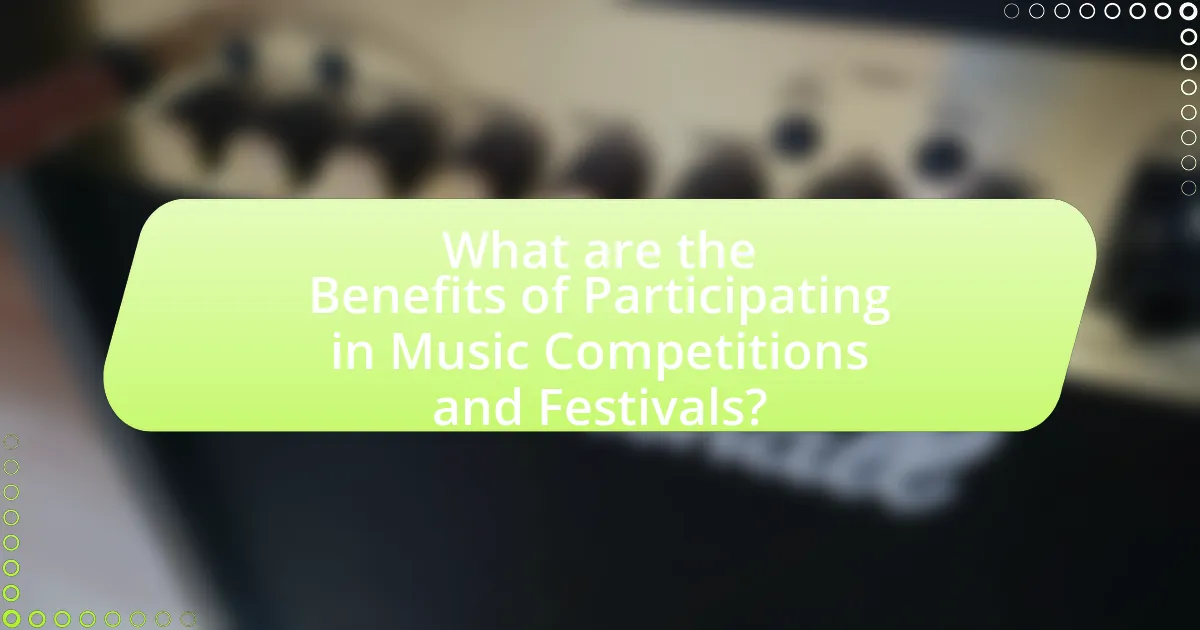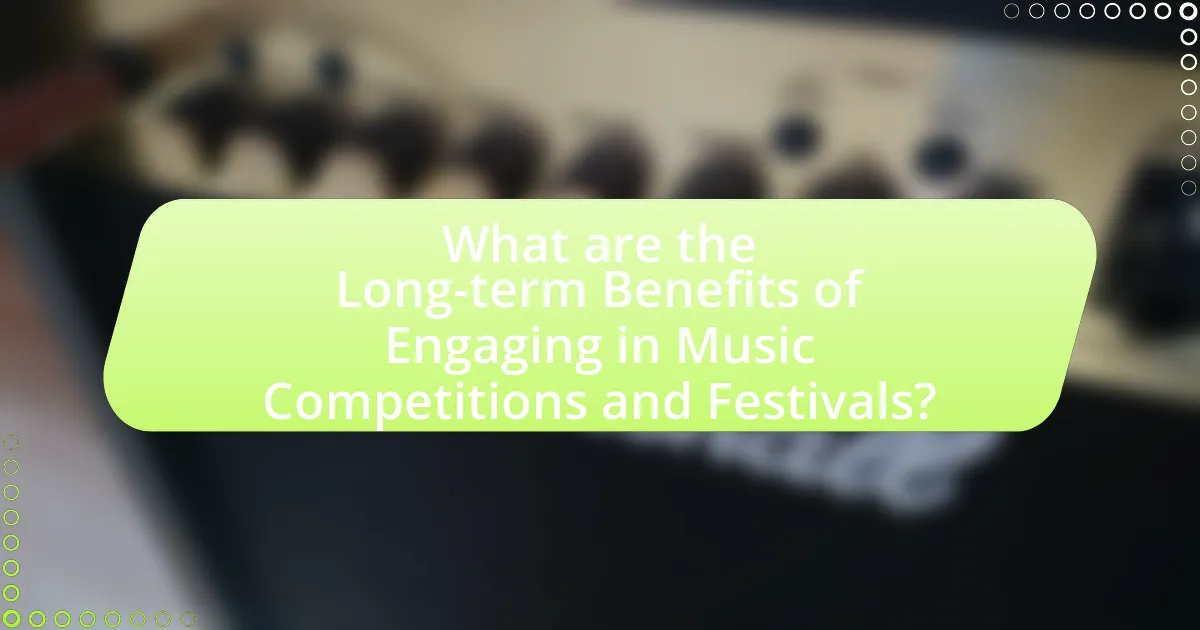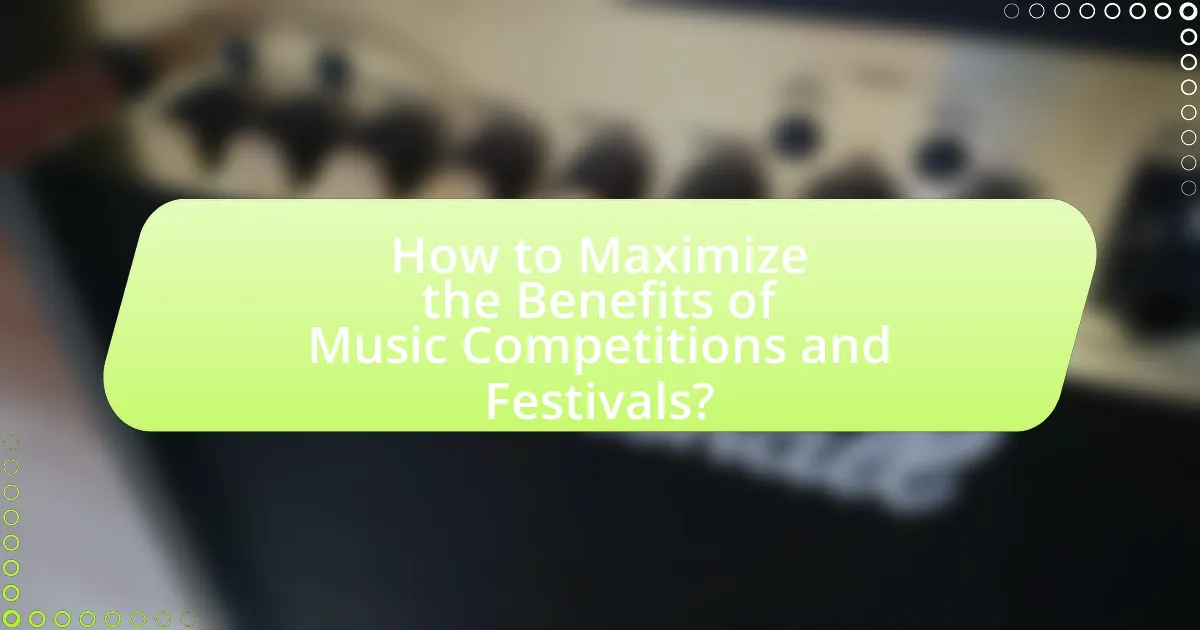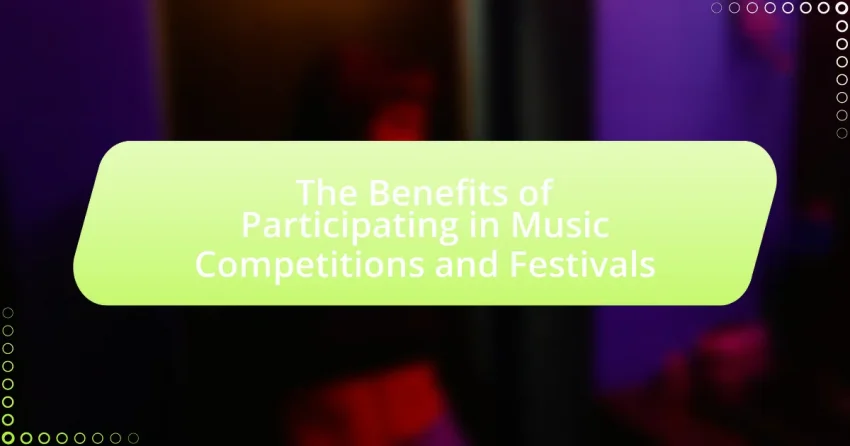Participating in music competitions and festivals provides musicians with significant benefits, including skill enhancement, networking opportunities, and increased visibility. These events foster technical and performance skill development through structured environments and feedback from judges, while also encouraging collaboration and peer support. Additionally, musicians gain confidence and stage presence by performing in front of audiences, which can lead to long-term career advancements and emotional well-being. The article explores how participation in these events can enhance musical abilities, create valuable industry connections, and contribute to personal growth in the competitive music landscape.

What are the Benefits of Participating in Music Competitions and Festivals?
Participating in music competitions and festivals offers numerous benefits, including skill enhancement, networking opportunities, and increased exposure. Musicians can refine their technical abilities and performance skills through the rigorous preparation required for competitions. Additionally, these events provide a platform for artists to connect with industry professionals, peers, and potential collaborators, fostering valuable relationships that can lead to future opportunities. Furthermore, performing in front of an audience at festivals can significantly boost a musician’s visibility, helping them gain recognition and potentially attract new fans. These advantages collectively contribute to the personal and professional growth of musicians in the competitive landscape of the music industry.
How do music competitions and festivals enhance musical skills?
Music competitions and festivals enhance musical skills by providing structured environments for performance, feedback, and peer interaction. These events challenge musicians to refine their techniques and interpretations under pressure, fostering growth. For instance, participants often receive critiques from judges, which can highlight areas for improvement and encourage focused practice. Additionally, the competitive aspect motivates musicians to elevate their performance standards, as seen in studies showing that performers in competitive settings often exhibit increased technical proficiency and artistic expression. Furthermore, networking opportunities at these events allow musicians to learn from one another, share experiences, and gain insights into diverse musical styles and practices.
What specific skills can be developed through participation?
Participation in music competitions and festivals can develop specific skills such as performance skills, teamwork, time management, and self-discipline. Performance skills are honed through the act of presenting music in front of an audience, which enhances stage presence and confidence. Teamwork is fostered when collaborating with other musicians, leading to improved communication and cooperative skills. Time management is developed as participants learn to balance practice schedules with other commitments, ensuring they meet deadlines for performances. Self-discipline is cultivated through the consistent practice required to prepare for competitions, reinforcing the importance of dedication and perseverance in achieving goals.
How does performance experience contribute to skill enhancement?
Performance experience significantly contributes to skill enhancement by providing musicians with real-time feedback and opportunities for practical application of their techniques. Engaging in competitions and festivals allows performers to face diverse audiences and varying performance conditions, which fosters adaptability and resilience. Research indicates that musicians who participate in live performances demonstrate improved technical proficiency and greater confidence, as evidenced by a study published in the Journal of Research in Music Education, which found that regular performance opportunities correlate with higher levels of musical competence and self-efficacy among participants.
Why are networking opportunities important in music competitions and festivals?
Networking opportunities are crucial in music competitions and festivals because they facilitate connections that can lead to career advancement. These events gather industry professionals, including producers, agents, and fellow musicians, creating an environment ripe for collaboration and exposure. For instance, a study by the Music Industry Research Association found that 70% of musicians attribute their career growth to networking at such events. This statistic underscores the importance of building relationships that can result in performance opportunities, mentorship, and access to resources that are essential for success in the music industry.
How can participants connect with industry professionals?
Participants can connect with industry professionals by attending networking events, workshops, and showcases organized during music competitions and festivals. These events often feature panels and discussions led by industry experts, providing opportunities for direct interaction. Additionally, participants can utilize social media platforms to engage with professionals, as many industry figures actively share insights and respond to inquiries online. Research indicates that 70% of jobs are found through networking, highlighting the importance of these connections in advancing careers in the music industry.
What role do peer relationships play in a musician’s growth?
Peer relationships significantly enhance a musician’s growth by providing emotional support, collaborative opportunities, and constructive feedback. These relationships foster a sense of community, which can motivate musicians to improve their skills and explore new musical ideas. Research indicates that musicians who engage with peers often experience increased creativity and performance confidence, as collaboration can lead to innovative approaches and shared learning experiences. For instance, studies show that musicians participating in group settings, such as ensembles or competitions, report higher levels of satisfaction and personal development, reinforcing the importance of peer interactions in their artistic journey.
What impact do music competitions and festivals have on confidence and stage presence?
Music competitions and festivals significantly enhance confidence and stage presence among participants. Engaging in these events provides musicians with opportunities to perform in front of audiences, which fosters a sense of accomplishment and reduces performance anxiety. Research indicates that regular participation in competitive environments can lead to improved self-esteem and a stronger stage presence, as musicians learn to navigate the challenges of live performance. For instance, a study published in the Journal of Music Therapy found that performers who participated in competitions reported higher levels of self-efficacy and comfort on stage compared to those who did not. This evidence underscores the positive correlation between music competitions, festivals, and the development of confidence and stage presence.
How does performing in front of an audience build confidence?
Performing in front of an audience builds confidence by providing individuals with real-time feedback and the opportunity to confront their fears. When musicians or performers take the stage, they experience a sense of accomplishment that reinforces their self-esteem. Research indicates that repeated exposure to performance situations can lead to desensitization to anxiety, making future performances less intimidating. A study published in the Journal of Music Therapy by Bradt and Dileo (2014) found that performance experiences significantly enhance self-efficacy and reduce performance anxiety, demonstrating that engaging with an audience fosters a more confident mindset.
What techniques can participants use to improve their stage presence?
Participants can improve their stage presence by practicing body language, engaging with the audience, and mastering vocal techniques. Body language, such as maintaining eye contact and using purposeful gestures, conveys confidence and helps connect with the audience. Engaging with the audience through smiles and interactions fosters a sense of connection, making the performance more memorable. Mastering vocal techniques, including projection and clarity, ensures that the message is delivered effectively. Research indicates that performers who actively engage with their audience and utilize effective body language are perceived as more charismatic and impactful, enhancing their overall stage presence.

What are the Long-term Benefits of Engaging in Music Competitions and Festivals?
Engaging in music competitions and festivals offers long-term benefits such as enhanced musical skills, increased confidence, and valuable networking opportunities. Musicians who participate in these events often experience significant improvement in their technical abilities and performance skills due to the rigorous preparation and feedback received from judges and peers. Research indicates that musicians who compete regularly tend to develop a stronger stage presence and greater resilience, which are crucial for their future careers. Additionally, these events provide a platform for building relationships with industry professionals, leading to potential collaborations and career advancements. Studies show that networking in such environments can result in mentorship opportunities and increased visibility in the music community, further supporting long-term career growth.
How can participation lead to career opportunities in music?
Participation in music competitions and festivals can significantly enhance career opportunities in music by providing exposure, networking, and skill development. Engaging in these events allows musicians to showcase their talents to industry professionals, which can lead to performance opportunities, collaborations, and even record deals. For instance, many successful artists, such as Taylor Swift and Ed Sheeran, gained initial recognition through competitions and festivals, which helped them build their careers. Additionally, these events often attract talent scouts and agents looking for new artists, further increasing the chances of career advancement.
What types of career paths can be pursued after competing?
After competing in music competitions and festivals, individuals can pursue various career paths such as professional performing artists, music educators, music producers, and composers. Professional performing artists often leverage competition experience to secure gigs and build a reputation in the industry. Music educators may teach in schools or offer private lessons, utilizing their competition background to enhance their teaching credibility. Music producers can work in studios, applying their skills to produce recordings, while composers may create original music for various media, including film and television. These career paths are supported by the fact that many successful musicians attribute their career advancements to the exposure and networking opportunities gained through competitions.
How do competitions influence a musician’s portfolio?
Competitions significantly enhance a musician’s portfolio by providing opportunities for recognition, skill development, and networking. Winning or placing in competitions often leads to increased visibility, which can attract potential collaborators, venues, and record labels. For instance, musicians who perform well in prestigious competitions, such as the International Tchaikovsky Competition, often experience a boost in their career, as evidenced by many past winners securing major recording contracts and concert engagements shortly after their success. Additionally, the experience gained from preparing for and participating in competitions helps musicians refine their technical skills and stage presence, further enriching their portfolio.
Why is feedback from judges valuable for musicians?
Feedback from judges is valuable for musicians because it provides objective assessments of their performance, highlighting strengths and areas for improvement. This external perspective is crucial for musicians seeking to refine their skills and enhance their artistry. Judges often possess extensive experience and expertise, allowing them to offer insights that musicians may overlook. For instance, constructive criticism can guide musicians in technical aspects, stage presence, and emotional expression, ultimately leading to better performances in future competitions or concerts.
What types of feedback can participants expect to receive?
Participants can expect to receive constructive feedback, performance evaluations, and personalized comments from judges in music competitions and festivals. Constructive feedback typically highlights strengths and areas for improvement, allowing participants to refine their skills. Performance evaluations often include ratings or scores based on specific criteria, providing a quantitative measure of their performance. Personalized comments from judges offer insights tailored to each participant, which can enhance their understanding of their musical expression and technique. This structured feedback is essential for growth and development in a competitive musical environment.
How can constructive criticism be utilized for improvement?
Constructive criticism can be utilized for improvement by providing specific, actionable feedback that highlights both strengths and areas for growth. In the context of music competitions and festivals, this feedback can guide musicians in refining their technique, enhancing their performance quality, and developing their artistic expression. Research indicates that musicians who actively seek and apply constructive criticism show significant progress in their skills, as it fosters a growth mindset and encourages continuous learning. For example, a study published in the Journal of Music Education Research found that students who received targeted feedback from judges improved their performance scores in subsequent competitions, demonstrating the effectiveness of constructive criticism in driving improvement.
What are the emotional and psychological benefits of participating in music competitions and festivals?
Participating in music competitions and festivals provides significant emotional and psychological benefits, including enhanced self-esteem, increased resilience, and improved social connections. Engaging in these events allows musicians to showcase their talents, which can lead to a boost in confidence as they receive feedback and recognition from peers and judges. Research indicates that performing in front of an audience can reduce anxiety and improve emotional regulation, as musicians learn to cope with pressure and develop a growth mindset. Additionally, these events foster a sense of community and belonging, as participants often form lasting friendships and networks, contributing to overall mental well-being.
How does participation affect mental health and well-being?
Participation in music competitions and festivals positively affects mental health and well-being by fostering social connections, enhancing self-esteem, and providing a sense of accomplishment. Engaging in these activities allows individuals to interact with peers, which can reduce feelings of isolation and promote a supportive community. Research indicates that social engagement is linked to lower levels of anxiety and depression, as seen in a study published in the Journal of Music Therapy, which found that music participation significantly improved emotional well-being among participants. Additionally, the process of preparing for and performing in competitions can boost self-confidence and provide a tangible sense of achievement, further contributing to improved mental health outcomes.
What role does community support play in a musician’s journey?
Community support is crucial in a musician’s journey as it provides encouragement, resources, and networking opportunities that can significantly enhance their career. Support from local fans, fellow musicians, and community organizations can lead to increased visibility and performance opportunities, which are essential for growth. For instance, musicians who participate in community events or festivals often gain access to larger audiences and industry contacts, facilitating their progression in the music scene. Research indicates that musicians with strong community ties are more likely to succeed, as they benefit from collaborative projects and shared resources, ultimately leading to a more sustainable career in music.

How to Maximize the Benefits of Music Competitions and Festivals?
To maximize the benefits of music competitions and festivals, participants should actively engage in networking, skill development, and performance opportunities. Networking with industry professionals and fellow musicians can lead to collaborations and mentorship, enhancing career prospects. Skill development occurs through feedback from judges and peers, which helps refine musical abilities. Additionally, performing in front of diverse audiences builds confidence and stage presence, essential for a successful music career. Research indicates that musicians who participate in competitions often experience increased visibility and opportunities, as evidenced by a study from the University of Southern California, which found that 70% of musicians reported career advancements following participation in such events.
What preparation strategies can enhance performance outcomes?
Effective preparation strategies that can enhance performance outcomes in music competitions and festivals include structured practice routines, mental visualization techniques, and performance simulations. Structured practice routines, which involve setting specific goals and focusing on challenging sections of the music, have been shown to improve skill acquisition and retention. Mental visualization techniques, where musicians mentally rehearse their performance, can enhance confidence and reduce anxiety, leading to better execution during actual performances. Performance simulations, which involve practicing in conditions similar to the competition environment, help musicians acclimate to the pressure and dynamics of live performances. Research indicates that these strategies collectively contribute to improved performance quality and overall success in competitive settings.
How can musicians effectively choose repertoire for competitions?
Musicians can effectively choose repertoire for competitions by selecting pieces that showcase their technical skills, musicality, and personal style. This selection process should consider the competition’s requirements, the musician’s strengths, and the emotional impact of the pieces. For instance, a study by the National Association for Music Education emphasizes the importance of repertoire that aligns with the performer’s abilities and the competition’s judging criteria, as this can significantly influence the overall performance outcome. Additionally, musicians should seek feedback from teachers or peers on their repertoire choices to ensure they resonate with the audience and judges alike.
What practice techniques are most effective before a competition?
Effective practice techniques before a competition include focused practice sessions, mental visualization, and mock performances. Focused practice sessions involve breaking down pieces into manageable sections and concentrating on specific technical challenges, which enhances skill retention and performance quality. Mental visualization, where musicians imagine themselves performing successfully, has been shown to improve confidence and reduce anxiety, as supported by research from the Journal of Sports Sciences. Mock performances simulate the competition environment, allowing musicians to practice under pressure, which helps in managing nerves and improving stage presence. These techniques collectively enhance preparation and performance outcomes in music competitions.
What are some common pitfalls to avoid during competitions and festivals?
Common pitfalls to avoid during competitions and festivals include inadequate preparation, poor time management, and neglecting to understand the rules. Inadequate preparation can lead to underperformance, as participants may not be familiar with their material or the competition format. Poor time management often results in rushed practices or last-minute changes, which can increase stress and decrease performance quality. Additionally, neglecting to understand the rules can lead to disqualification or penalties, as participants may inadvertently violate guidelines. These pitfalls can significantly impact the overall experience and outcomes of competitions and festivals.
How can anxiety be managed before and during performances?
Anxiety can be managed before and during performances through techniques such as deep breathing, visualization, and positive self-talk. Deep breathing helps regulate physiological responses by reducing heart rate and promoting relaxation, which is essential for performers facing anxiety. Visualization involves mentally rehearsing the performance, allowing individuals to create a positive outcome in their minds, which can enhance confidence and reduce fear. Positive self-talk reinforces a performer’s belief in their abilities, countering negative thoughts that contribute to anxiety. Research indicates that these techniques can significantly lower anxiety levels, as evidenced by a study published in the Journal of Music Therapy, which found that musicians who practiced these methods reported decreased performance anxiety and improved overall performance quality.
What mistakes should participants be aware of to ensure a positive experience?
Participants should be aware of the mistake of under-preparing for their performances, as this can lead to anxiety and poor execution. Proper preparation, including practice and understanding the competition’s requirements, significantly enhances performance quality and confidence. Research indicates that musicians who engage in thorough preparation experience lower levels of performance anxiety and higher satisfaction with their experience, as noted in a study published in the Journal of Music Education Research.
What tips can help musicians make the most of their competition experience?
Musicians can maximize their competition experience by thoroughly preparing their performance, understanding the competition rules, and networking with other participants. Thorough preparation involves practicing extensively to ensure technical proficiency and emotional expression, which can significantly impact judges’ perceptions. Understanding the competition rules helps musicians align their performance with the expectations of the judges, increasing their chances of success. Networking with fellow musicians can lead to valuable connections, collaborations, and insights into the industry, enhancing their overall experience. These strategies are supported by the fact that well-prepared musicians often receive higher scores in competitions, as noted in various studies on performance outcomes.
